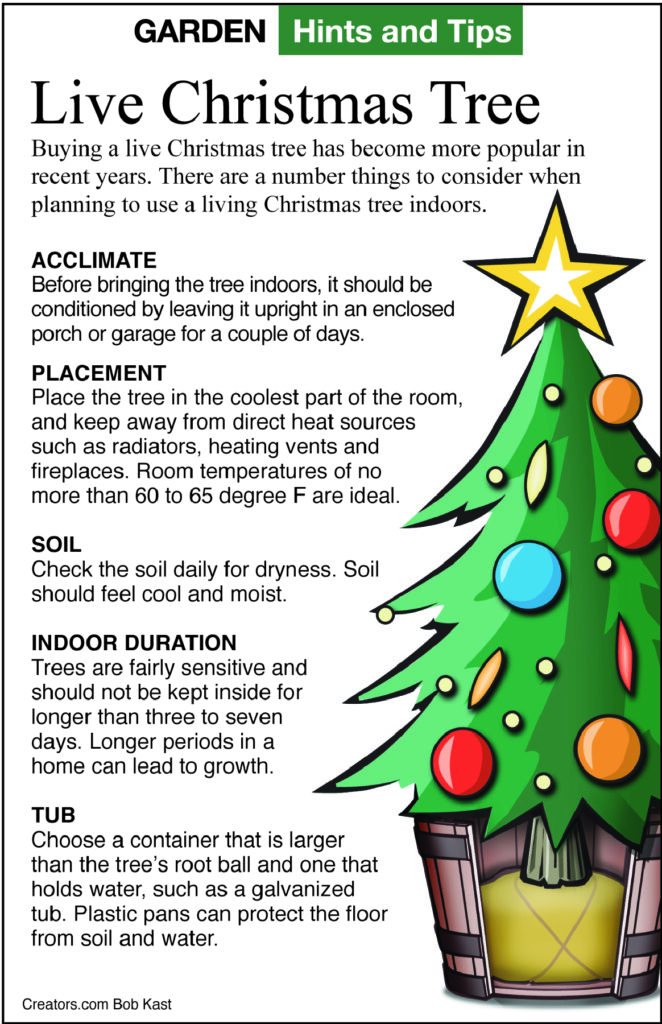Search Posts
Recent Posts
- Homeless in RI: “I was not able to see how I was…”, Encampment moves, Pallets stall, Street Sights May 9, 2024
- We Cook! Mill’s Tavern’s Statler Chicken, Edamame, Corn, Potato Succotash, Dijon Demi May 9, 2024
- Rhode Island Weather for May 9, 2024 – John Donnelly May 9, 2024
- Business Beat: RI-based Ocean State Job Lot a “Gold Winner”, US Best Managed Company May 9, 2024
- RI Veterans: Did you know? 09.05.24 (Events, remembrance, resources, more…) – John A. Cianci May 9, 2024
Categories
Subscribe!
Thanks for subscribing! Please check your email for further instructions.

A Greener View: A live Christmas Tree and protect shrubs from winter animals – Jeff Rugg
by Jeff Rugg, contributing writer
Question: We were thinking of using a live Christmas tree this year instead of cutting one down. After the New Year, we want to plant it in our yard. Is there anything we should know about how to do this?
Answer: There are several evergreen tree species that can be used as a Christmas tree. Pick a tree that is appropriate for your landscape in terms of size and growth requirements such as sun or shade and soil moisture needs. It doesn’t have to be a typical evergreen, so be creative. A maple or a palm would be just as good with the lights, decorations and presents.
The indoor temperatures are going to be much warmer than the outdoor air the tree will be living in, so you will need to acclimate the tree to the changes. Move the tree from the cold air and wind into an unheated garage for a few days before moving it indoors.
Keep it indoors for only a few days to a week at most. Move it back into the unheated space for a few days before planting it. Measure the tree with the container to make sure it is short enough to be able to fit into the room. Remember that the roots will be very heavy, cumbersome and possibly muddy. Water the tree for a day or two before bringing it in. It may not need to be watered while it is indoors, but keep an eye on it. Water it again when it goes back into the garage. Prepare the hole for the tree as soon as possible while the soil is not frozen very deep. Measure the size and depth of the root ball or container, and make sure the hole is big enough. Don’t make the hole too deep or the tree will sink and be difficult to raise back up to the proper height.
Store the soil in the garage, where it can be kept loose and not frozen into a solid lump. Store some mulch, too. Fill the hole with straw or paper, and cover it with a tarp to keep it from filling with water and freezing solid. After Christmas and the garage acclimation time, you will plant the tree as you would any other tree. Water it in, and cover the root ball with mulch.

Question: Last year, we lost some shrubs to deer or rodents eating the trunks. I hope I am not too late to do something this year. Is there something I can treat them with to stop the damage?
Answer: There are many sprays, liquids and powders available at the store and created with home recipes. They all work, but they may need multiple treatments during the winter as they eventually wear off. During the winter, the snow cover may make it difficult to treat the lower parts of the stems where the rodents will be eating, hidden under the snow. The strongest layer of protection is a physical barrier. Fencing of some kind is best. Wrap a single trunked tree in a layer of chicken wire or hardware cloth. Chicken wire fencing may have large enough holes between the wires to allow mice and voles to nibble on the bark, so a couple of wraps around the trunk may be necessary. Fencing may need to be added to raise the protection higher, if snow creates an artificial ground layer that is higher up.
If you want to prevent a deer from eating the ends of the branches on a specimen tree, you can use a wire to create a new branch. Just take a short piece of a soft wire, and loosely wrap it on the end of the branch, and let it stick out past the end of the branch a few inches. It will look like the end of the branch to the deer, and when it nibbles on it, there won’t be anything edible.
___
To read more columns on gardening by Jeff, go to: https://rinewstoday.com/?s=jeff+rugg

Email questions to Jeff Rugg at [email protected]. To find out more about Jeff Rugg and read features by other Creators Syndicate writers and cartoonists, visit the Creators Syndicate website at www.creators.com.
COPYRIGHT 2020 JEFF RUGG – DISTRIBUTED BY CREATORS SYNDICATE
